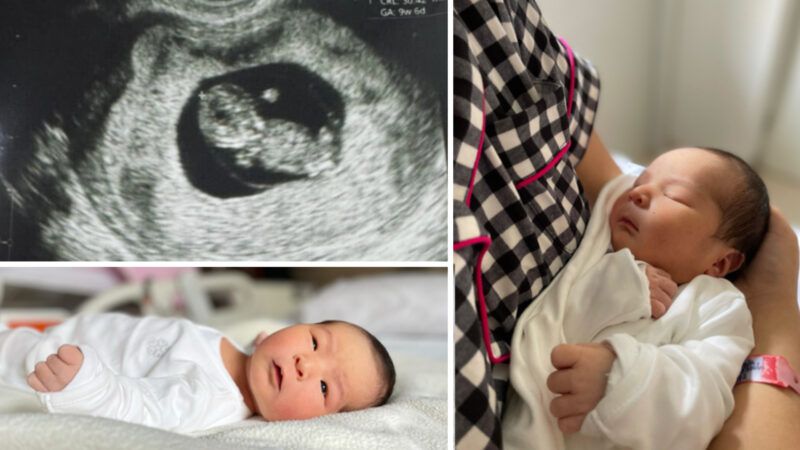Disrupting IVF? Baby Born From Egg Matured Outside of Mother's Body.
The process "reduces the duration of treatment cycles to just three days" and "replaces 80% of hormone injections required with traditional IVF," Gameto says.

A company called Gameto claims to have successfully matured eggs outside of the female body, a development that could revolutionize the in vitro fertilization (IVF) process. "We are thrilled to announce a medical milestone–the world's first live birth using our product, Fertilo, that matures eggs outside the body," the company posted on X last week.
Gameto's process involves extracting immature eggs from a woman's body and then using "engineered, young ovarian support cells to recreate the natural egg maturation process in a laboratory setting." This process "reduces the duration of treatment cycles to just three days" and "replaces 80% of hormone injections required with traditional IVF," the company says.
You are reading Sex & Tech, from Elizabeth Nolan Brown. Get more of Elizabeth's sex, tech, bodily autonomy, law, and online culture coverage.
Making IVF Better
IVF has helped countless people with fertility issues to start families, but it remains incredibly taxing on the mother's body even before a successful pregnancy starts. In a typical IVF process, eggs mature within a woman's body as they would with a non-assisted conception. In order to ensure that the woman produces at least one and ideally multiple eggs, she's generally given hormone injections for up to two weeks beforehand, in addition to other drugs.
These hormones and medications can induce a host of side effects. These include headaches, mood swings, insomnia, hot flashes, abdominal pain, pain at the injection site, and, in an estimated 1 to 5 percent of women, ovarian hyperstimulation syndrome. Ovarian hyperstimulation syndrome involves a swelling of the ovaries that can cause mild pain, nausea, and other unpleasant side effects in mild cases and, in severe cases, rapid weight gain, severe pain, shortness of breath, kidney problems, and blood clots. Ovarian stimulation processes can also increase the risk of ectopic pregnancy.
A process to mature eggs outside of a woman's ovaries could be beneficial for avoiding these side effects, and be especially useful for more at-risk populations. It could also significantly decrease the amount of time needed for the IVF process.
'A Turning Point in Reproductive Health'
Gameto claims not only to have successfully matured eggs outside of the body but to have done so for a pregnancy that resulted in a recent birth.
"On Saturday, December 7th, a healthy baby girl was born in Lima, Peru, after using the Fertilo protocol at our partner clinic [Clinica Concebir]," Gameto reported. "This marks the first ever human birth that occurred as a result of" this technology.
"Fertilo's innovative approach made the physical experience easier and also lightened the emotional burden of many hormone injections," said the unnamed mother of the child in a statement put out by Gameto.
Undoubtedly, some people will balk at this advance, viewing it as unnatural and thus, somehow, suspect. But not so long ago, many people viewed all assisted reproduction with suspicion or doubt; now, it's mainstream and commonplace.
If Gameto's process can help more people who want to have children to do so, and can make the process less physically arduous and time consuming, these are undoubtedly good things.
"By overcoming the major challenges of conventional IVF, such as long treatment cycles, significant side effects, and the emotional and physical strain, Fertilo provides a potentially faster, safer, and more accessible solution for families," said Dina Radenkovic, co-founder and CEO of Gameto, in a statement. "This milestone marks a turning point in reproductive health and highlights the first application of [Induced pluripotent stem cell (iPSC) ] technology in IVF and the immense potential of our technology."
Gameto says it has gotten approval from governments in Australia, Japan, Argentina, Paraguay, Mexico, and Peru to use Fertilo for IVF patients. "In the U.S., the company is preparing for Phase 3 trials," it reports.
IVF…and Beyond
Gameto said its Fertilo process was carried out using induced pluripotent stem cell (iPSC) technology. Using iPSC in reproduction has been a scientific goal for a while—and the potential goes way beyond what Gameto is doing now. Scientists hope to eventually create human egg and sperm cells essentially from scratch.
Using iPSC tech, any basic somatic cell from the human body can generate what's known as a pluripotent stem cell. From there, iPSCs "can self-renew indefinitely in culture and differentiate into all specialized cell types including gametes," as Sharif Moradi and a team of researchers explained in a 2019 article published in the journal Stem Cell Research & Therapy.
This is incredibly cool, and has all sorts of potential applications. "Since they can be generated from any healthy person or patient, iPSCs are considered as a valuable resource for regenerative medicine to replace diseased or damaged tissues," write Moradi and his colleagues.
The implications for reproduction are also huge.
In May 2023, Eli Adashi, a Brown University reproductive biology specialist, told NPR that developing human egg and sperm cells from iPSCs—a process called in vitro gametogenesis (IVG)—was still "on the precipice of materialization." NPR cautioned that "the realization of the advance for humans likely is still years away," and "may never happen."
But if/when this advance is realized, "IVG would enable infertile women and men to have children with their own DNA instead of genes from the sperm and eggs or donors. Same goes for women of any age, rendering the biological clock irrelevant.…IVG could also enable gay and trans couples to have babies that are genetically related to both partners."
In addition to technological hurdles here, there are regulatory ones, of course.
Peter Marks, director of the Center for Biologics Evaluation and Research at the U.S. Food and Drug Administration (FDA), told NPR last year that the agency is "very interested in helping [IVG technology] to move it forward." But "this creeps out our attorneys," he said, noting that Congress bans the FDA from giving a green light to proposals that involve genetically manipulated human embryos. Marks notes Congress currently prohibits the FDA from even considering any proposals that would involve genetically manipulated human embryos, and this could seriously hinder the development of IVG technology in the U.S.
Nonetheless, at least two U.S. companies—Conception and Ivy Natal—have been working on IVG. "It could lead to so many people being able to have, you know, families and children to be able to have lives," Matt Krisiloff, one of Conception's founders, told NPR last year. "I just think that's a really beautiful thing."
More Sex & Tech News
• Ben Sperry, a senior scholar with the International Center for Law and Economics (ICLE), has a good year-end reflection on international developments related to kids, technology, and "protection."
• The Ohio legislature has passed a bill similar to a Florida measure famously dubbed the "Don't Say Gay" bill. House Bill 8, which is waiting on Gov. Mike DeWine's signature, would make schools "tell parents about any age-appropriate 'sexuality content' taught and any health care provided to students so parents could opt their children out," reports The Enquirer. "Opponents contend that the bill…would allow schools to censor books or classroom instruction and potentially out LGBTQ students to unsupportive or unsafe parents." Ohio also passed a bill that would create the criminal offense of "grooming."
• Pornhub is now blocking access for residents of Florida, owing to the state's age verification law.
• "A trial in Romania for Andrew Tate, the online influencer who is facing criminal accusations involving human trafficking and sexual misconduct, will not go ahead, at least for now, after an appeals court sent an indictment back to prosecutors," The New York Times reported last week. "The Bucharest Court of Appeal found that the indictment did not meet the requirements for the case to move to a trial."
Today's Image



Show Comments (22)